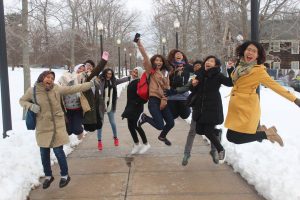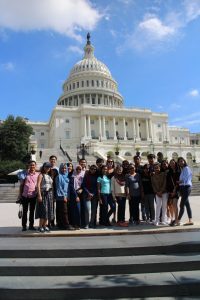UConn Wins Grant for US-Cuba Student Research Exchange Program
The 100,000 Strong in the Americas Innovation Fund has awarded UConn with a grant to establish a U.S.-Cuban exchange program aimed at studying food production and security.
Read more below.
Anna Zarra Aldrich & Jessica McBride, Office of the Vice President for Research
The University of Connecticut (UConn) has received a grant from the 100,000 Strong in the Americas Innovation Fund for a U.S.-Cuban exchange program aimed at studying food production and security. The project is the culmination of collaborations between UConn’s College of Agriculture, Health and Natural Resources, the Office of Global Affairs, and Cuban partner institutions.
The 100,000 Strong in the Americas Innovation Fund is the dynamic public-private sector partnership between the U.S. Department of State, Partners of the Americas, and NAFSA: Association of International Educators. The fund aims to increase the number of U.S. students studying abroad in Latin America and the Caribbean. The Marlene M. Johnson Innovation Challenge that is supporting this project is sponsored by the Association of International Educators and CAF Development Bank of Latin America.
The grant will cover the study abroad expenses of 12 UConn undergraduate students from the College of Agriculture, Health and Natural Resources and six Cuban graduate students from the country’s leading agricultural schools, the Instituto of Ciencia Animal, Instituto Nacional de Ciencias Agrícolas, Centro Nacional de Sanidad Agropecuaria and Universidad Agraria de La Habana.
UConn students will work with a diverse group of Cuban professionals and workers including farmers, government officials, scientists, urban agriculture practitioners and community leaders to learn about the history and future of food production and stability.
According to collaborators from UConn, the project will foster student mobility and allow them to interact with people from diverse socio-economic backgrounds whom they are unlikely to encounter at home.
“This exchange system will help students nurture a greater understanding of the culture of another people and promote a sense of global humanitarian responsibility,” said the Principal Investigator of the project, UConn Global Training and Development Institute Director, Dr. Roy Pietro. “We hope that participation in the program will help students from both nations expand their world views, understand a different culture, and form lasting connections that will promote continued communication between individuals from the two countries.”
On a larger scale, the program aims to encourage cooperation between the U.S. and Cuba on vital economic, environmental and societal issues that impact agriculture. Ideally, this increased cooperation will alleviate historical tensions to promote significant mutual interests in both nations.
Pietro and co-PIs Ana Legrand and Guillermo Risatti are confident that the program will attract students interested in studying food systems to consider performing research in Cuba given the program’s targeting research focus and financial support that alleviates the economic burden of studying abroad.
The collaborative relationship between UConn and this Cuban educational and research consortium was established in January 2017 with the support of UConn’s Office of Global Affairs and encourages an enhanced level of understanding and appreciation of each other’s culture, society, values, and institutions after participating in the program; and that they will gain new knowledge and insights into issues and challenges around agriculture. The exchange program and collaborative relationship is supported jointly by UConn’s College of Agriculture, Health, and Natural Resources and Global Affairs.
Students involved in the program will travel to Cuba for two weeks in May 2018. Cuban students are expected to participate in the exchange during two weeks over the summer of 2018.

